Featured Non-Fiction & Biography

I'M GLAD MY MOM DIED
by Jenette McCurdy
A heartbreaking and hilarious memoir by iCarly and Sam & Cat star Jennette McCurdy about her struggles as a former child actor—including eating disorders, addiction, and a complicated relationship with her overbearing mother—and how she retook control of her life.
Jennette McCurdy was six years old when she had her first acting audition. Her mother’s dream was for her only daughter to become a star, and Jennette would do anything to make her mother happy. So she went along with what Mom called “calorie restriction,” eating little and weighing herself five times a day. She endured extensive at-home makeovers while Mom chided, “Your eyelashes are invisible, okay? You think Dakota Fanning doesn’t tint hers?” She was even showered by Mom until age sixteen while sharing her diaries, email, and all her income.
In I’m Glad My Mom Died, Jennette recounts all this in unflinching detail—just as she chronicles what happens when the dream finally comes true. Cast in a new Nickelodeon series called iCarly, she is thrust into fame. Though Mom is ecstatic, emailing fan club moderators and getting on a first-name basis with the paparazzi (“Hi Gale!”), Jennette is riddled with anxiety, shame, and self-loathing, which manifest into eating disorders, addiction, and a series of unhealthy relationships. These issues only get worse when, soon after taking the lead in the iCarly spinoff Sam & Cat alongside Ariana Grande, her mother dies of cancer. Finally, after discovering therapy and quitting acting, Jennette embarks on recovery and decides for the first time in her life what she really wants.
Told with refreshing candor and dark humor, I’m Glad My Mom Died is an inspiring story of resilience, independence, and the joy of shampooing your own hair.

PATH LIT BY LIGHTNING
by David Maraniss
A riveting new biography of America’s greatest all-around athlete by the bestselling author of the classic biography When Pride Still Mattered.
Jim Thorpe rose to world fame as a mythic talent who excelled at every sport. He won gold medals in the decathlon and pentathlon at the 1912 Stockholm Olympics, was an All-American football player at the Carlisle Indian School, the star of the first class of the Pro Football Hall of Fame, and played major league baseball for John McGraw’s New York Giants. Even in a golden age of sports celebrities, he was one of a kind.
But despite his colossal skills, Thorpe’s life was a struggle against the odds. As a member of the Sac and Fox Nation, he encountered duplicitous authorities who turned away from him when their reputations were at risk. At Carlisle, he dealt with the racist assimilationist philosophy “Kill the Indian, Save the Man.” His gold medals were unfairly rescinded because he had played minor league baseball. His later life was troubled by alcohol, broken marriages, and financial distress. He roamed from state to state and took bit parts in Hollywood, but even the film of his own life failed to improve his fortunes. But for all his travails, Thorpe did not succumb. The man survived, complications and all, and so did the myth.

THIS STORY WILL CHANGE: A MEMOIR
by Elizabeth Crane
Rachel Cusk meets Nora Ephron in this intimate and evolving portrait about the end of a marriage and how life can fall apart and be rebuilt in wonderful and surprising ways
One minute Elizabeth Crane and her husband of fifteen years are fixing up their old house in Upstate New York, finally setting down roots after stints in Chicago, Texas, and Brooklyn, when his unexpected admission—I’m not happy—changes everything. Suddenly she finds herself separated and in couples therapy, living in an apartment in the city with an old friend and his kid. It’s understood that the apartment and bonus family are temporary, but the situation brings unexpected comfort and much-needed healing for wounds even older than her marriage.
Crafting the story as the very events chronicled are unfolding, Crane writes from a place of guarded possibility, capturing through vignettes and collected moments a semblance of the real-time practice of healing. At turns funny and dark, with moments of poignancy, This Story Will Change is an unexpected and moving portrait of a woman in transformation, a chronicle of how even the stories we tell ourselves about ourselves are bound to change.

IF NIETSCHE WERE A NARWHAL
by Justin Gregg
“A dazzling, delightful read on what animal cognition can teach us about our own mental shortcomings.”
– Adam Grant
This funny, “extraordinary and thought-provoking” (The Wall Street Journal) book asks whether we are in fact the superior species. As it turns out, the truth is stranger—and far more interesting—than we have been led to believe.
If Nietzsche Were a Narwhal overturns everything we thought we knew about human intelligence, and asks the question: would humans be better off as narwhals? Or some other, less brainy species? There’s a good argument to be made that humans might be a less successful animal species precisely because of our amazing, complex intelligence.
All our unique gifts like language, math, and science do not make us happier or more “successful” (evolutionarily speaking) than other species. Our intelligence allowed us to split the atom, but we’ve harnessed that knowledge to make machines of war. We are uniquely susceptible to bullshit (though, cuttlefish may be the best liars in the animal kingdom); our bizarre obsession with lawns has contributed to the growing threat of climate change; we are sexually diverse like many species yet stand apart as homophobic; and discriminate among our own as if its natural, which it certainly is not. Is our intelligence more of a curse than a gift?
As scientist Justin Gregg persuasively argues, there’s an evolutionary reason why human intelligence isn’t more prevalent in the animal kingdom. Simply put, non-human animals don’t need it to be successful. And, miraculously, their success arrives without the added baggage of destroying themselves and the planet in the process.
In seven mind-bending and hilarious chapters, Gregg highlights one feature seemingly unique to humans—our use of language, our rationality, our moral systems, our so-called sophisticated consciousness—and compares it to our animal brethren. Along the way, remarkable tales of animal smarts emerge, as you’ll discover:
The house cat who’s better at picking winning stocks than actual fund managers
Elephants who love to drink
Pigeons who are better than radiologists at spotting cancerous tissue
Bumblebees who are geniuses at teaching each other soccer
What emerges is both demystifying and remarkable, and will change how you look at animals, humans, and the meaning of life itself.
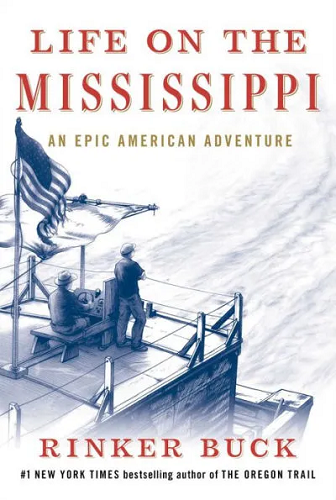
LIFE ON THE MISSISSIPPI
by Rinker Buck
The eagerly awaited return of master American storyteller Rinker Buck, Life on the Mississippi is an epic, enchanting blend of history and adventure in which Buck builds a wooden flatboat from the grand “flatboat era” of the 1800s and sails it down the Mississippi River, illuminating the forgotten past of America’s first western frontier.
Seven years ago, readers around the country fell in love with a singular American voice: Rinker Buck, whose infectious curiosity about history launched him across the West in a covered wagon pulled by mules and propelled his book about the trip, The Oregon Trail, to ten weeks on the New York Times bestseller list. Now, Buck returns to chronicle his latest incredible adventure: building a wooden flatboat from the bygone era of the early 1800s and journeying down the Mississippi River to New Orleans.
A modern-day Huck Finn, Buck casts off down the river on the flatboat Patience accompanied by an eccentric crew of daring shipmates. Over the course of his voyage, Buck steers his fragile wooden craft through narrow channels dominated by massive cargo barges, rescues his first mate gone overboard, sails blindly through fog, breaks his ribs not once but twice, and camps every night on sandbars, remote islands, and steep levees. As he charts his own journey, he also delivers a richly satisfying work of history that brings to life a lost era.
The role of the flatboat in our country’s evolution is far more significant than most Americans realize. Between 1800 and 1840, millions of farmers, merchants, and teenage adventurers embarked from states like Pennsylvania and Virginia on flatboats headed beyond the Appalachians to Kentucky, Mississippi, and Louisiana. Like the Nile, the Thames, or the Seine before them, the western rivers in America became a floating supply chain that fueled national growth. Settler families repurposed the wood from their boats to build their first cabins in the wilderness; cargo boats were broken apart and sold to build the boomtowns along the water route. Joining the river traffic were floating brothels, called “gun boats”; “smithy boats” for blacksmiths; even “whiskey boats” with taverns mounted on jaunty rafts. In the present day, America’s inland rivers are a superhighway dominated by leviathan barges—carrying $80 billion of cargo annually—all descended from flatboats like the ramshackle Patience, which must avoid being crushed alongside their metal hulls.
As a historian, Buck resurrects the era’s adventurous spirit, but he also challenges familiar myths about American expansion, confronting the bloody truth behind settlers’ push for land and wealth. The Indian Removal Act of 1830 forced more than 125,000 members of the Cherokee, Choctaw, and several other tribes to travel the Mississippi on a brutal journey en route to the barrens of Oklahoma. Simultaneously, almost a million enslaved African Americans were carried in flatboats and marched by foot 1,000 miles over the Appalachians to the cotton and cane fields of Arkansas, Mississippi, and Louisiana, birthing the term “sold down the river.” Weaving together a tapestry of first-person histories, Buck portrays this watershed era of American expansion as it was really lived.
With a rare narrative power that blends stirring adventure with absorbing untold history, Life on the Mississippi is a muscular and majestic feat of storytelling from a writer who may be the closest that we have today to Mark Twain.
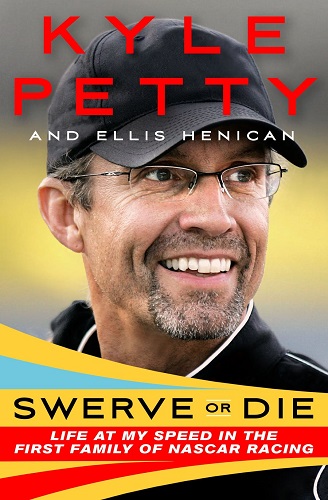
SWERVE OR DIE
by Kyle Petty & Ellis Henican
Stock-car racing star, country singer, and sports broadcaster Kyle Petty shares his familial legacy, intertwined with NASCAR’s founding and history, in Swerve or Die―written with Pulitzer Prize-winner Ellis Henican, the New York Times bestselling coauthor of In the Blink of an Eye.
“Born into racing royalty. The only son of NASCAR’s winningest driver ever. The grandson of one of the sport’s true pioneers. The nephew of our very first Hall of Fame engine builder. It’s quite a family to represent, and through it all, I’ve somehow managed to keep being Kyle.”
Kyle Petty won his very first stock-car race, the Daytona ARCA 200, in 1979 when he was eighteen. Hailed as a third-generation professional NASCAR racer, he became an instant celebrity in circles he had been around all his young life. Despite being the grandson and son of racing champions Lee Petty and Richard Petty, Kyle didn’t inherit innate talent. Working in his family’s North Carolina race shop from an early age, he learned all about car mechanics and maintenance long before he got behind the wheel. And although Kyle continued the family business, driving “Petty blue” colored cars emblazoned with his grandfather’s #42―a number once used by Marty Robbins―his career took a different route than his forebears’.
In Swerve or Die: Life at My Speed in the First Family of NASCAR Racing, Kyle chronicles his life on and off the racetrack, presenting his insider’s perspective of growing up throughout the sport’s popular rise in American culture. In between driving and running Petty Enterprises for thirty years, Kyle took some detours into country music, voiced Cal Weathers in Pixar’s Cars 3, and started his annual motorcycle Kyle Petty Charity Ride Across America. And when his nineteen-year-old son Adam, a fourth-generation racing Petty, tragically lost his life on the track, Kyle founded Victory Junction, a camp for children with chronic and serious medical conditions in Adam’s name―with help from Academy Award-winning actor and motorsports enthusiast Paul Newman.
Filled with NASCAR history, stories of his family’s careers, and anecdotes about some of stock-car racing’s most famous drivers, Kyle’s memoir also tackles the sport’s evolution, discussing how welcoming diverse racers, improving car and track safety features, and integrating green technology will benefit NASCAR’s competitors and fans in the future.
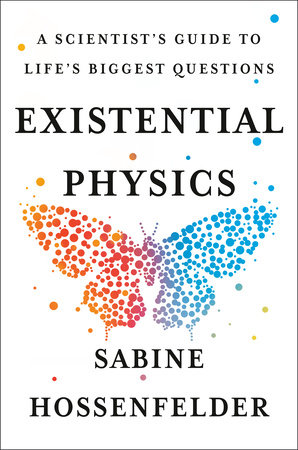
EXISTENCIAL PHYSICS
by Sabine Hossenfelder
“Stimulating . . . encourage[s] readers to push past well-trod assumptions […] and have fun doing so.” —Science Magazine
“Hossenfelder is a rare gem. There are other theoretical physicists out there who can write for a popular audience, but very few of them are able to do so in such a no-nonsense way. The result is not just illuminating, but enjoyable.” —Charles Seife, author of Decoding the Universe
From renowned physicist and creator of the YouTube series “Science without the Gobbledygook,” a book that takes a no-nonsense approach to life’s biggest questions, and wrestles with what physics really says about the human condition
Not only can we not currently explain the origin of the universe, it is questionable we will ever be able to explain it. The notion that there are universes within particles, or that particles are conscious, is ascientific, as is the hypothesis that our universe is a computer simulation. On the other hand, the idea that the universe itself is conscious is difficult to rule out entirely.
According to Sabine Hossenfelder, it is not a coincidence that quantum entanglement and vacuum energy have become the go-to explanations of alternative healers, or that people believe their deceased grandmother is still alive because of quantum mechanics. Science and religion have the same roots, and they still tackle some of the same questions: Where do we come from? Where do we go to? How much can we know? The area of science that is closest to answering these questions is physics. Over the last century, physicists have learned a lot about which spiritual ideas are still compatible with the laws of nature. Not always, though, have they stayed on the scientific side of the debate.
In this lively, thought-provoking book, Hossenfelder takes on the biggest questions in physics: Does the past still exist? Do particles think? Was the universe made for us? Has physics ruled out free will? Will we ever have a theory of everything? She lays out how far physicists are on the way to answering these questions, where the current limits are, and what questions might well remain unanswerable forever. Her book offers a no-nonsense yet entertaining take on some of the toughest riddles in existence, and will give the reader a solid grasp on what we know—and what we don’t know.
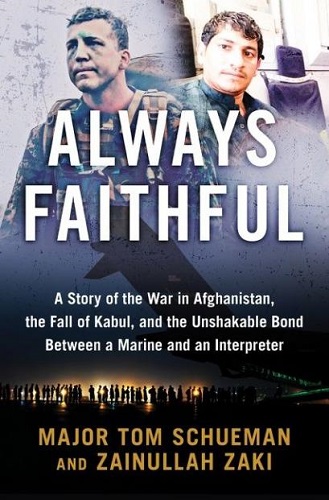
ALWAYS FAITHFUL
by Maj. Tom Schueman & Zainullah Zaki
Band of Brothers meets Argo in this dramatic and heartfelt dual memoir of the war in Afghanistan told by two men from opposite worlds. Always Faithful entwines the stories of Marine Major Tom Schueman, and his friend and Afghan interpreter, Zainullah “Zak” Zaki, as they describe their parallel lives, converging paths, and unbreakable bond in the face of overwhelming danger, culminating in Zak and his family’s harrowing escape from Kabul.
In August of 2021, just days shy of the 20th anniversary of 9/11, America ended its longest war. The speed of the Afghanistan’s fall was so stunning that thousands of Afghan citizens who had helped American forces over the course of two decades—and had been promised visas in return—were suddenly stranded, in extreme, imminent danger. As the world watched the shocking scenes of desperation at the Kabul airport in the final two weeks of August, Maj. Tom Schueman fought—both behind the scenes and through a social media campaign—to get his friend and former Afghan interpreter, Zak, out of Afghanistan before he and his family were discovered by the Taliban. When Zak and his family finally took off from the airport mere days before the US left the country, the years-long effort to get Zak to America culminated in two simple words on Instagram: “Wheels up.”
Now in Always Faithful, Tom and Zak tell the full story of the divergent paths that led them to Afghanistan, the dangerous road they walked together in service to America, and how their commitment to each other ended up saving them both. Brilliantly told in Tom’s and Zak’s alternating first person voices, Always Faithful tracks the parallel lives of these two men who each spent their childhoods in fear, peril, and poverty, and turned to war in attempt to build a meaningful future. On an inevitable course towards each other, their lives dovetail in Afghanistan’s deadly Helmand Valley, where they formed a brotherhood that transcends even the most overwhelming of odds, eventually culminating in Zak’s harrowing, eleventh-hour rescue.
The end result is an intensely personal and uniquely ground-level account of Tom and Zak’s experience, Always Faithful gives readers a 360-degree view of the war. At once provocative and heart pounding, their stories together form a microcosm of the complicated and lasting effects of America’s longest war. Through their eyes and their experiences, they challenge readers to explore the legacy of the war for American and Afghan citizens alike, as we all collectively seek to understand whether twenty years of war was worth the price.
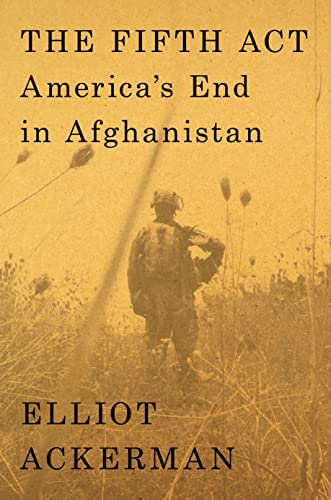
THE FIFTH ACT
by Elliot Ackerman
A powerful and revelatory eyewitness account of the American collapse in Afghanistan, its desperate endgame, and the war’s echoing legacy
Elliot Ackerman left the American military ten years ago, but his time in Afghanistan and Iraq with the Marines and later as a CIA paramilitary officer marked him indelibly. When the Taliban began to close in on Kabul in August 2021 and the Afghan regime began its death spiral, he found himself pulled back into the conflict. Afghan nationals who had worked closely with the American military and intelligence communities for years now faced brutal reprisal and sought frantically to flee the country with their families. The official US government evacuation effort was a bureaucratic failure that led to a humanitarian catastrophe. With former colleagues and friends protecting the airport in Kabul, Ackerman joined an impromptu effort by a group of journalists and other veterans to arrange flights and negotiate with both Taliban and American forces to secure the safe evacuation of hundreds. These were desperate measures taken during a desperate end to America’s longest war. For Ackerman, it also became a chance to reconcile his past with his present.
The Fifth Act is an astonishing human document that brings the weight of twenty years of war to bear on a single week, the week the war ended. Using the dramatic rescue efforts in Kabul as his lattice, Ackerman weaves a personal history of the war’s long progression, beginning with the initial invasion in the months after 9/11. It is a play in five acts, the fifth act being the story’s tragic denouement, a prelude to Afghanistan’s dark future. Any reader who wants to understand what went wrong with the war’s trajectory will find a trenchant account here. But The Fifth Act also brings readers into close contact with a remarkable group of characters, American and Afghan, who fought the war with courage and dedication, and at great personal cost. Ackerman’s story is a first draft of history that feels like a timeless classic.
Still Hot in Non-Fiction & Biography
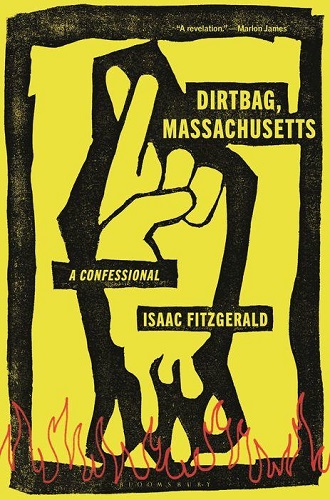
DIRTBAG, MASSACHUSETTS
by Isaac Fitzgerald
INSTANT NEW YORK TIMES BESTSELLER
INSTANT USA TODAY BESTSELLER
“The best of what memoir can accomplish… pulling no punches on the path to truth, but it always finds the capacity for grace and joy.” –Esquire, “Best Memoirs of the Year”
A TIME Best Book of the Summer * A Rolling Stone Top Culture Pick * A Publishers Weekly Best Memoir of the Season * A Buzzfeed Book Pick * A Goodreads Readers’ Most Anticipated Book * A Chicago Tribune Book Pick * A Boston.com Book You Should Read * A Los Angeles Times Book to Add to Your Reading List * An Entertainment Weekly Best Book of the Month * A 2022 New England Book Award Finalist
Isaac Fitzgerald has lived many lives. He’s been an altar boy, a bartender, a fat kid, a smuggler, a biker, a prince of New England. But before all that, he was a bomb that exploded his parents’ lives―or so he was told. In Dirtbag, Massachusetts, Fitzgerald, with warmth and humor, recounts his ongoing search for forgiveness, a more far-reaching vision of masculinity, and a more expansive definition of family and self.
Fitzgerald’s memoir-in-essays begins with a childhood that moves at breakneck speed from safety to violence, recounting an extraordinary pilgrimage through trauma to self-understanding and, ultimately, acceptance. From growing up in a Boston homeless shelter to bartending in San Francisco, from smuggling medical supplies into Burma to his lifelong struggle to make peace with his body, Fitzgerald strives to take control of his own story: one that aims to put aside anger, isolation, and entitlement to embrace the idea that one can be generous to oneself by being generous to others.
Gritty and clear-eyed, loud-hearted and beautiful, Dirtbag, Massachusetts is a rollicking book that might also be a lifeline.

CRYING IN H MART
by Michelle Zauner
NEW YORK TIMES BEST SELLER • From the indie rock sensation known as Japanese Breakfast, an unforgettable memoir about family, food, grief, love, and growing up Korean American—“in losing her mother and cooking to bring her back to life, Zauner became herself” (NPR) • CELEBRATING OVER ONE YEAR ON THE NEW YORK TIMES BEST SELLER LIST
In this exquisite story of family, food, grief, and endurance, Michelle Zauner proves herself far more than a dazzling singer, songwriter, and guitarist. With humor and heart, she tells of growing up one of the few Asian American kids at her school in Eugene, Oregon; of struggling with her mother’s particular, high expectations of her; of a painful adolescence; of treasured months spent in her grandmother’s tiny apartment in Seoul, where she and her mother would bond, late at night, over heaping plates of food.
As she grew up, moving to the East Coast for college, finding work in the restaurant industry, and performing gigs with her fledgling band–and meeting the man who would become her husband–her Koreanness began to feel ever more distant, even as she found the life she wanted to live. It was her mother’s diagnosis of terminal cancer, when Michelle was twenty-five, that forced a reckoning with her identity and brought her to reclaim the gifts of taste, language, and history her mother had given her.
Vivacious and plainspoken, lyrical and honest, Zauner’s voice is as radiantly alive on the page as it is onstage. Rich with intimate anecdotes that will resonate widely, and complete with family photos, Crying in H Mart is a book to cherish, share, and reread.
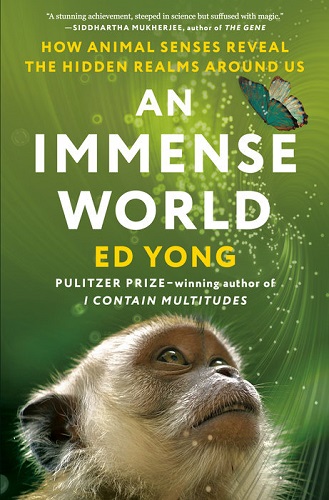
AN IMMENSE WORLD
by Ed Yong
NEW YORK TIMES BESTSELLER • Every kind of animal, including humans, is enclosed within its own unique sensory bubble, perceiving but a tiny sliver of our immense world. Pulitzer Prize–winning science journalist Ed Yong takes us on “a thrilling tour of nonhuman perception” (The New York Times), allowing us to experience the skeins of scent, waves of electromagnetism, and pulses of pressure that other animals perceive.
“One of this year’s finest works of narrative nonfiction . . . Yong’s reporting is layered, seasoned with vivid scenes from laboratories and in the field, interviews with researchers across a spectrum of disciplines.”—Oprah Daily
“A dazzling ride through the sensory world of astoundingly sophisticated creatures.”—The Wall Street Journal
The Earth teems with sights and textures, sounds and vibrations, smells and tastes, electric and magnetic fields. In An Immense World, Ed Yong coaxes us beyond the confines of our own senses to encounter beetles that are drawn to fires, turtles that can track the Earth’s magnetic fields, fish that fill rivers with electrical messages, and even humans who wield sonar like bats. We discover that a crocodile’s scaly face is as sensitive as a lover’s fingertips, that the eyes of a giant squid evolved to see sparkling whales, that plants thrum with the inaudible songs of courting bugs, and that even simple scallops have complex vision. We learn what bees see in flowers, what songbirds hear in their tunes, and what dogs smell on the street. We listen to stories of pivotal discoveries in the field, while looking ahead at the many mysteries that remain unsolved.
Funny, rigorous, and suffused with the joy of discovery, An Immense World takes us on what Marcel Proust called “the only true voyage . . . not to visit strange lands, but to possess other eyes.”
